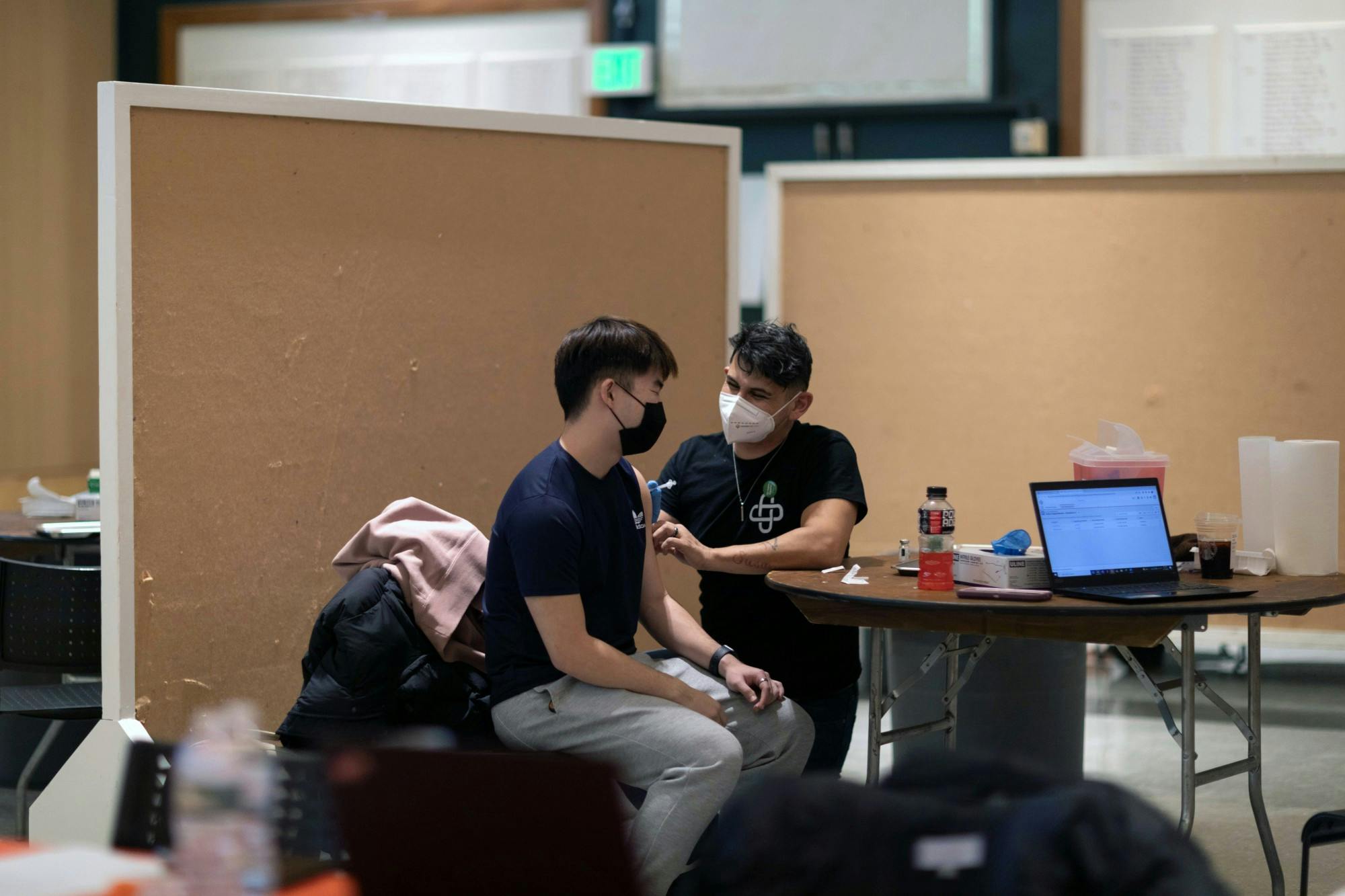On Jan. 10 and Jan. 11, approximately 700 booster shots out of the available 1,000 were administered to students, faculty and staff at the on-campus COVID-19 clinic in Alumni Hall, according to College spokesperson Diana Lawrence.
The College held its first booster clinic at Alumni Hall on Dec. 6, during winter break, for students. On Dec. 18, the College announced a booster shot mandate: All students, faculty and staff would be required to get an additional shot by Jan. 31 or within 30 days of becoming eligible.
In an email statement, Lawrence wrote that discussions regarding the possibility of offering booster clinics were considered by the COVID-19 leadership group in November. She added that the Upper Valley Regional Public Health Network provided the Pfizer boosters, while Axiom Medical — a medical consulting firm employed by the College — provided the Moderna boosters. Axiom staff administered both companies’ boosters at the clinic.
Armond Dorsey GR’23 said they “loved how easy” it was to sign up, noting that the College made the registration process “straightforward” by sending students a link directly.
While Dorsey said they experienced a “short wait” to receive the booster at the clinic, they noted that there was some confusion over which line was for registration and which was for getting the booster.
Michael Cullen Th’22 said that although getting the shot was easy, he had difficulties rescheduling his appointment. He added that when he wasn’t able to reschedule, the clinic “didn't seem like they cared too much,” and he was able to receive his booster outside of his scheduled appointment time.
Like Dorsey, Cullen also noted confusion over the two separate lines, in addition to some “holdup” in the distribution of boosters — specifically for the Pfizer shots. The exact breakdown in the number of Pfizer and Moderna vaccines that were administered is unavailable, Lawrence wrote.
According to the Centers for Disease Control and Prevention, anyone over 12 is eligible for a Pfizer booster, while those over 18 are eligible for the Pfizer, Moderna and Johnson & Johnson booster. The wait time between receiving the second dose of the Pfizer or Moderna vaccine and the booster is 5 months, while the wait time for a J&J booster is 2 months.
Kaynaan Henry ’24 received his booster from the clinic on Jan. 10. He said he experienced some soreness right after receiving it, but “didn’t feel the full effect” of the booster until the next day, when he experienced a severe headache and felt nauseous.
“I felt really nauseous and I actually had to cancel going to class that day because I physically could not get up and be active,” Henry said. “I did have to stay in for the rest of the day.”
According to the CDC, reactions from receiving a booster are “similar to those after the two-dose or single-dose primary series,” and side effects to the booster include tiredness, headache, muscle pain, chills, fever and nausea.
Henry, who received the Moderna booster, said that after drinking fluids and taking ibuprofen, he felt better by the end of the day.
Rene Rodriguez ’22, who received his booster at the clinic, said that he wasn’t planning on getting the booster originally, but did so when the College mandated it. According to Rodriguez, he would have prefered to not get the vaccine, citing the number of breakthrough cases among his friends.
“I honestly would much rather not have gotten it just because of what’s going on right now,” Rodriguez said. “Everyone’s getting sick either way, like my friends who have the booster are still getting [COVID-19]. So I don’t really see the point in it, but as long as I don’t have really bad side effects, I’m okay with it.”
While breakthrough cases are still possible among fully vaccinated individuals, the CDC notes that those individuals are “less likely to develop serious illness than those who are unvaccinated and get COVID-19.” In addition, the World Health Organization has presented studies that demonstrate that individuals with a booster have “substantial protection” against the omicron variant, according to The New York Times.
The College’s decision to mandate boosters came after the administration encouraged students to receive the booster shot in early December. In the campus-wide email explaining its decision, the College cited the surge of the delta and omicron variants. As of Jan. 12, there are 544 active cases on campus.
Everett Magnuson ’22, who received the booster on Jan. 11, said he was traveling frequently over winterim, and that the on-campus clinic was his “first good opportunity to get [the booster].” In regard to the College’s decision to mandate boosters, he said he “didn’t really care.”
Dorsey said he agrees with the College’s decision to mandate boosters, as it provides students with the “best chances of staying in good health.” Cullen noted that students share “responsibility for the wellbeing of both ourselves and those around us” and added that it is “not unreasonable to mandate that people be vaccinated.”
“It’s shown to reduce your symptoms if you get it, and also your transmissibility to others,” Cullen said. “So I think that it is absolutely reasonable that in order to be a part of this institution that you do be vaccinated.”
The College is now working to schedule another booster clinic before the end of the month, Lawrence wrote.
According to the COVID-19 Response Team, students who have received their booster but have not submitted medical documentation must send their NetID and a photo of their vaccination card to Dick’s House by Jan. 31.
Daniel Modesto ’24 is the News executive editor. He is from Brooklyn, New York, and is a Native American and Indigenous Studies major modified with Latin American, Latino and Caribbean Studies.




